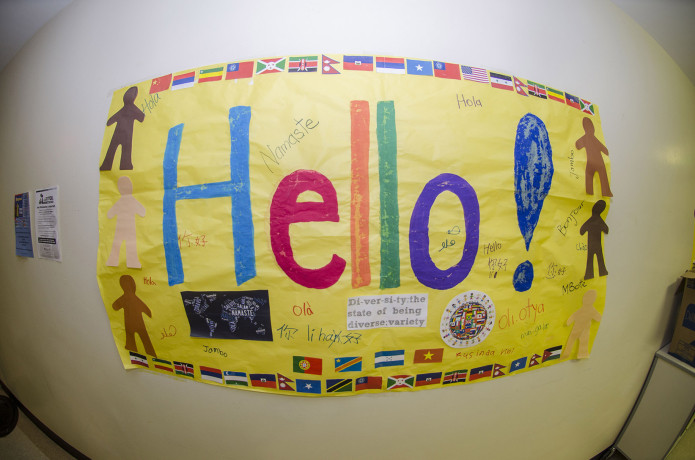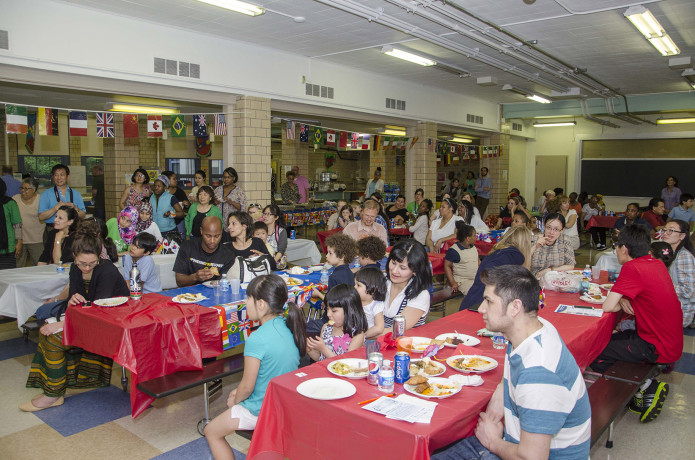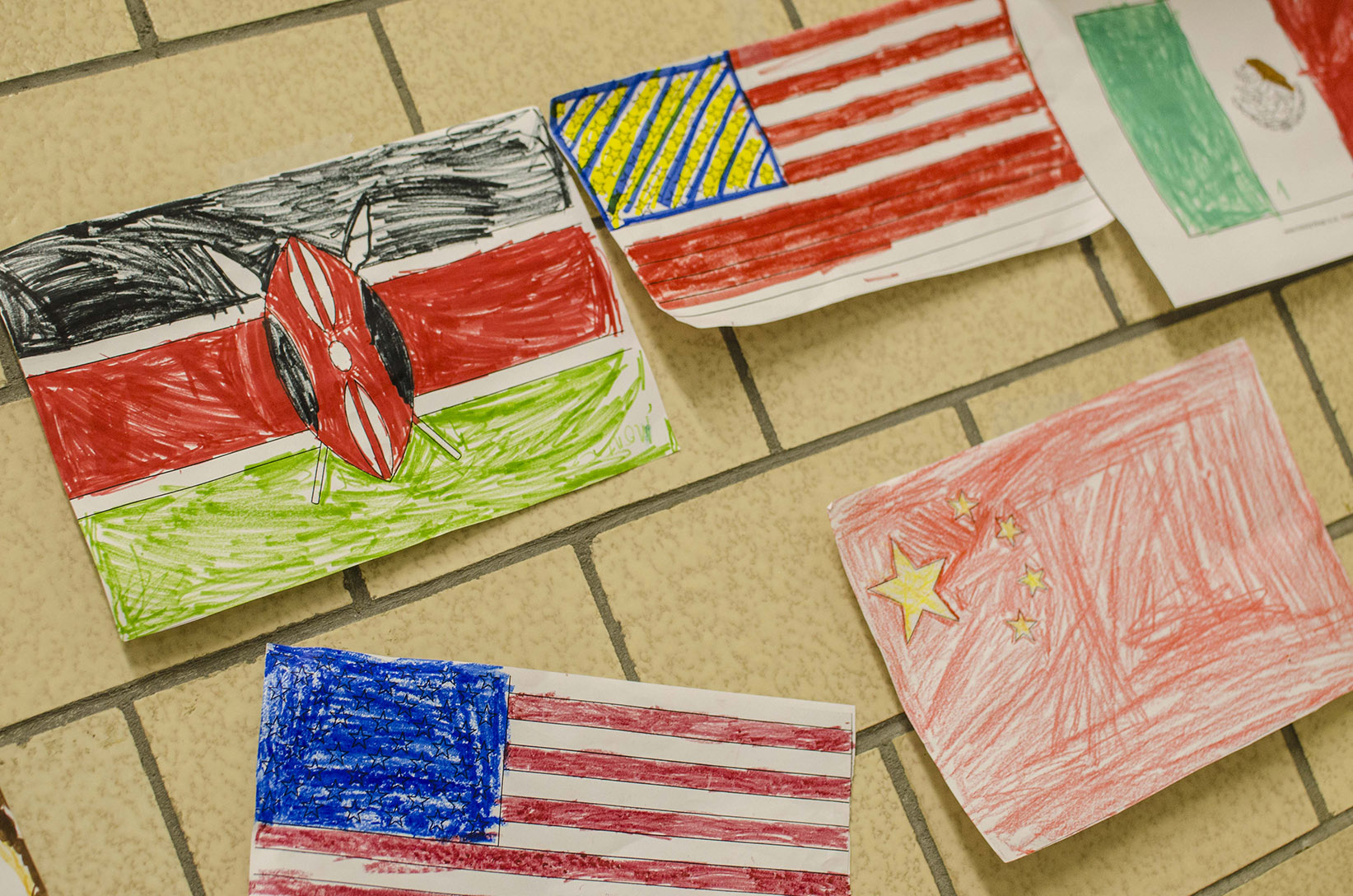At first glance it looks like any other public school family night, with handmade decorations, happy kids running around under the watchful eyes of parents and teachers, and trays of home-made food laid out on tables along the normally quiet hallways.
But closer inspection – and a whiff of the exotic aromas filling the air – reveals that this is no ordinary night at Arsenal Elementary and Middle School in Pittsburgh’s Lawrenceville neighborhood.
The food comes from Asia, Africa, Latin America and points in between. Amid conversations in English can be heard snippets of French, Chinese, Spanish, Hindi, Arabic and a few other languages not often associated with Pittsburgh.
Welcome to Arsenal 360 Night, a project of Lawrenceville United supported by The Sprout Fund through The Global Switchboard’s Community of Practice grants.
“Arsenal has 25 different countries represented by the student population,” says Dave Breingan, a community organizer with Lawrenceville United. “And we wanted to take a night to really celebrate all those different cultures and bring their stories to the forefront of both the school but also the community.”
Lawrenceville United describes itself as “an inclusive, resident-driven community-based non-profit organization focused on improving quality of life of Lawrenceville residents and stakeholders through community engagement and advocacy, community restoration and beautification, and community planning and development.”
Arsenal 360 Night grew out of the PEP Rally Program Breingan that runs in three public schools in the neighborhood to strengthen and support them through community partnerships and parent engagement.
The event was successful in drawing more than 20 families representing 15 different countries, Breingan says. They offered food, performances and presentations about their home countries.
Breingan believes that another key to the event’s success was that it was largely driven by members of the community.
“Staff and professional groups were in the audience seat, and families were leading the programming, and I think that staff actually really appreciated that,” he says. “And families appreciated the chance to talk about their culture, talk about their home countries, and share their favorite dish. It was a learning experience for everybody and just a great way to create a good school climate.”
Parent Qin Wu says she likes having her daughter Azura, who will be entering 6th grade, attend a school with such a diverse student body.
“For our children, it’s a good chance for them to have the opportunity to make friends from different countries and know their cultures,” she says. “I think it’s a good thing for them.”

“ARSENAL HAS 25 DIFFERENT COUNTRIES REPRESENTED BY THE STUDENT POPULATION.”
Asha Salim, a 7th grader at Arsenal, was born in Kenya, but her family is originally from Somalia. She enjoys meeting people who might share the same experience of coming from other countries.
“I’ve got so many friends from all over,” she says. “They care about me and we get along so good, even if I’m different; I’m African.”
Ruthie Rea, Arsenal Elementary Principal, confirmed that the event and related activities are helping improve the learning experience for students.
“It definitely helps them to be more aware of our world as a whole,” she says while standing in the happy flow of students and parents. “It makes us all richer – learning who we are as a people.”
Arsenal 5th grader Gabby Reed has lived in Pittsburgh all her life. She says she likes making friends with people from other countries.
“I can learn about other people’s cultures and their languages,” she says.
The diversity of the school, and efforts to connect all students to the global influences around them, has convinced at least one parent to keep their child at Arsenal instead of sending her to a private school. That’s not something you hear every day.
“We sent [our daughter] here because she was too young to go to the private Christian school where our older daughter goes,” says parent Jennifer Pelling, who lives in Garfield. “Now she is old enough to transfer, but we chose not to.”
Pelling says her daughter goes to class and eats lunch with children from 15 different countries.
“When we look at a map of the world, she can relate to those countries because she has friends from there,” she says. “She has a personal connection with them. It’s simple and personal. I love this, too.”
It’s that personal connection – global engagement without even knowing the meaning of the words – that spells success for the program, Breingan says.
“We’ve got this amazing diversity at Arsenal that doesn’t happen many places in Pittsburgh,” he says. “We have the children of Somali Bantu refugees eating lunch with the sons of Chinese doctors who are visiting with UPMC, with Garfield families and Lawrenceville families. We felt that was a strength and wanted to do more with it and give regular families an opportunity to lend their voice to the conversation.”
It’s a conversation that’s just getting started, he says, and one that The Global Switchboard, located just blocks from Arsenal, can help continue.
“I’m interested in thinking about ways that we can connect what’s happening in that school building with what’s happening at [the Switchboard], which I think is representative of what’s going on all over the world,” he says. “So how can we connect those things and make it an educational experience for our kids because it’s so important in the 21st century, and it should be part of our education.”



